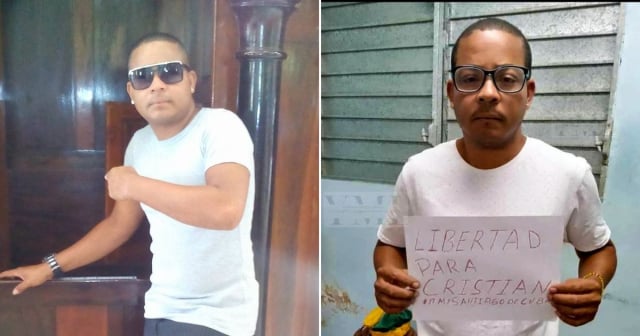The activist Marisol Peña Cobas, wife of the opponent José Luis Acosta Cortellán, stood this Monday in a public square in Camagüey to demand their release after the arbitrary arrest suffered by both on Sunday when they were on their way to the Las Mercedes church.
In one of his direct social networks, Peña Cobas explained what happened this Sunday, when she and her husband were violently detained by the police. According to what he said, they were both riding a bicycle when they were intercepted by a patrol that stopped them and jumped on them.
In order not to fall under its wheels, the opponent maneuvered until he felt safe, a gesture that the regime's repressors interpreted as contempt and which served as a pretext to violently arrest them in the vicinity of Plaza Méndez, including beatings.
After being detained for more than five hours, State Security (DSE) released Peña Cobas, but detained Acosta Cortellán in the 2nd. unit of the Camagüey police, accusing him of the alleged crime of “disobedience,” according to Radio Television Martí.
“A few blocks from my house, in Plaza Méndez, we see a patrol and a [State] Security agent tells us to stop, but the patrol corners us and presses us against the platform and José cannot stop because If it stops, we will be under the wheels of the patrol. When we managed to stabilize ourselves, we stopped and they grabbed us, hit us and took us to the 3rd. Unity in Monte Carlo,” the activist told the aforementioned media.
Peña Cobas insisted on her husband's innocence and her willingness to fabricate charges against him, and denounced the risk to their physical integrity posed by the violent arrest carried out by the DSE.
“José did not stop because, if he stops, we will fall under the wheel of the police car. "They almost knocked us down, they almost ran over us," he said. Before releasing Peña Cobas, the repressors issued him a warning and threatened him with death.
Seeing that her husband was being unjustly detained, the activist decided to stand in the Plaza del Gallo, in front of the Church of Nuestra Señora de la Soledad, with a sign demanding the release of her husband. Peña Cobas stated that he would not move from there until Acosta Cortellán was free.
“They told me that I couldn't go to church anymore because I was going to church to take communion against communism; to leave the country, because this was the last time they were going to let me through. They also asked me if the people took to the streets again, if I was going to go out, I answered: 'if the people go out again, of course I'm going to go out,' said the activist.
Although Peña Cobas was supported by other activists who showed her solidarity, including priests Castor Alvarez (arrested and beaten on June 11) and Oca Mountains, who came to show her their affection and interest, the woman was hurt by the indifference of many other Camagüeyans.
“In Camagüey there is no opposition left and the people are so afraid that they are indifferent,” he expressed, drawing a panorama of fear and apathy in civil society after the wave of repression unleashed as a result of the historic protests of 11J, and the departure from the country of hundreds of thousands of Cubans that has characterized the largest migration crisis in the history of Cuba.
During her address from the park where she remains planted, Peña Cobas denounced the presence of repressors around her in the Plaza del Gallo. “There are strange movements of people in civilian clothes and police patrols. They put on gloves, a face mask, and glasses, so that they are not recognized,” he said.
Due to their activism, the marriage of Peña Cobas and Acosta Cortellán has been the subject of repression for years. In December 2020, both were arrested with extreme violence by the police in the middle of a square in Camagüey.
Shortly before, in November, the activist, her husband and another opponent They joined the hunger strike started by the San Isidro Movement (MSI) to demand the release of the rapper Denis Solis and the closure of MLC stores by the authorities of the Cuban regime.
In January of this year, Peña Cobas used his social networks to denounce the critical situation of public health in Cuba, after her husband's leg was immobilized with a plastic piece of a “cold light” lamp, instead of with a cast.
What do you think?
COMMENTFiled in:
